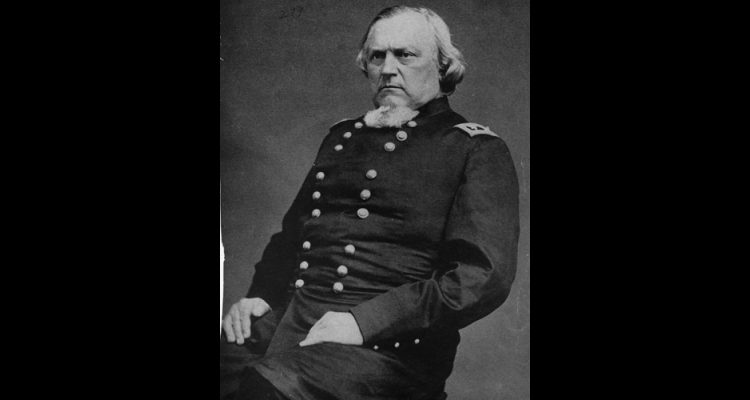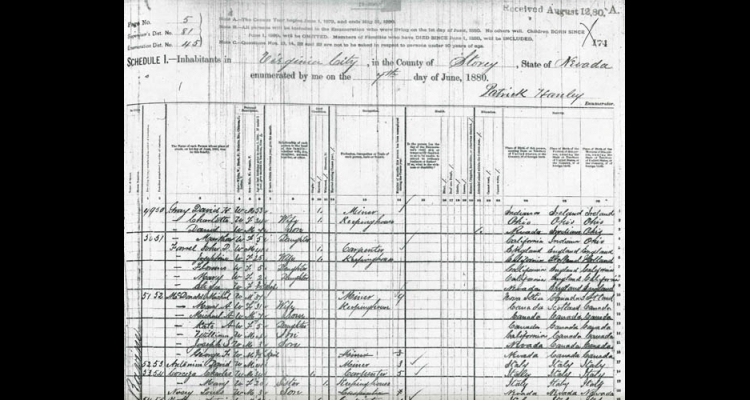James Warren Nye
Nevada's only territorial governor, James Warren Nye, was born in New York on June 10, 1814 or 1815, the seventh of ten children. Nye was educated at home and attended Hamilton Seminary for one term. He worked as a stagecoach driver for four years before studying law. Nye passed the New York Bar exam in 1839. He married Elsie Benson that same year, and the couple had two children.
Nye, a Democrat, was active in local politics and won election as Madison County District Attorney (1839) and County Judge (1840-1848). He ran for Congress in 1848 as a Free-Soil Democrat who opposed slavery in the territories. He lost to the incumbent, and soon after his defeat, Nye moved to Syracuse, taking a position on the Metropolitan Police Commission, eventually becoming the commission's first president (1857-1860).
The newly-organized Republican Party fit with Nye's ideology, and he switched affiliation. In 1860, Nye campaigned for William Seward in his presidential campaign. After Abraham Lincoln received the party nomination, Nye avidly campaigned for him. Lincoln commissioned Nye as governor of Nevada territory, created by Congress on March 2, 1861.
Among Governor Nye's goals, once he assumed his new office, were to tame the remote territory, to hasten Nevada toward admission to the Union, and to redeem his ambition to become a U.S. Senator. Nye ordered a census, organized judicial districts, called for creation of a legislative body consisting of a Council and House of Representatives, and established districts pending formation of counties.
Governor Nye also served as superintendent of Indian Affairs. In May 1862, Nye met with the principal leaders of the Northern Paiutes, including Winnemucca and Numaga, to create a peace policy. Sarah Winnemucca, daughter of Chief Winnemucca and passionate advocate for the Paiute people, related in her book Life Among the Paiutes that Nye was the "only governor who ever helped my people." In October 1863, Governor Nye signed the Treaty of Peace and Friendship with the Shoshone Indians at Ruby Valley.
As Nevada's territorial governor, Nye strongly supported civil rights; he was one of a handful of political leaders opposed to discriminatory legislation. He was equally outspoken in his opposition to gambling, encouraging the First Territorial Legislature to pass stringent laws to prevent gambling.
After Nevada was admitted to the union as the thirty-sixth state on October 31, 1864, Nye served as the new state's first governor. Henry G. Blasdel was elected governor in November 1864, taking over the reins of government a month later on December 5. Nye County was named for Nye that same year.
The Nevada legislature elected Nye and William M. Stewart as Nevada's two U.S. senators. The Nevada Legislature reelected Nye in 1867, and he served until 1873. Nye served as chairman of the Committee on Enrolled Bills (39th Congress), the Committee on Revolutionary Claims (40th Congress), and the Committee on Territories (41st Congress). Nye was committed to Reconstruction and opposed slavery and bigotry. His stand as a dedicated Radical Republican resulted in a political rift between himself and Secretary of State Seward. Nye also supported universal suffrage, including women's right to vote.
In 1872, without a major source of financial support, Nye stood no chance of reelection. Two Comstock millionaires, William Sharon and John P. Jones, decided to try for the senate post. Sharon dropped out, leaving Nye and Jones. Jones had a great deal of money, and spent nearly $500,000 to buy candidates who would support him. When the legislature met in January 1873, Jones received fifty-three votes; Nye's name was never introduced for consideration.
James Warren Nye, Nevada's only territorial governor, the state's first governor, and one of its first U.S. senators, returned to his native New York. He died on Christmas Day 1876, and was buried in Woodlawn Cemetery, New York City.
Article Locations
Related Articles
None at this time.
Further Reading
None at this time.


